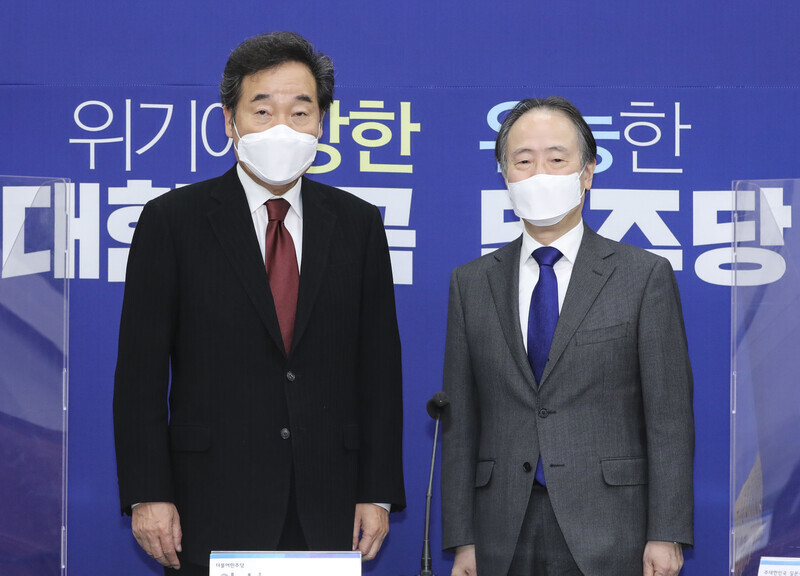hankyoreh
Links to other country sites 다른 나라 사이트 링크
Democratic Party leader says he demanded “transparent disclosure” of information about Fukushima water treatment

Democratic Party Lee Nak-yeon, considered one of the preeminent “Japan watchers” among South Korean politicians, requested the transparent disclosure of information about treatment of radioactive water from the Fukushima Daiichi Nuclear Power Plant during a meeting with Japanese Ambassador to South Korea Koji Tomita on Oct. 22.
Speaking to reporters after his meeting with Tomita at the National Assembly that morning, Lee said, “I stressed the need for the transparent disclosure of all information regarding treatment of water from the Fukushima nuclear power plant, and told him that Japan needs to proceed with the support of the international community.”
Lee also quoted Tomita as replying that the Japanese government “has not finalized its decision and is aware of South Korea’s concerns,” adding that he would “agree to the two requests” from Lee.
“Ambassador Tomita said that all information is being shared in a transparent manner, and that the International Atomic Energy Agency [IAEA] has shared the position that [the release of contaminated water] is technically feasible and consistent with international practice,” Lee said.
Japan’s dumping of contaminated water from Fukushima into the ocean is a sensitive issue that could lead to an outpouring of anti-Japan sentiment in South Korea. The Japanese government is currently treating the water with an advanced liquid processing system (ALPS) to remove radioactive substances and storing it in 1,000-ton tanks. The number of storage tanks has exceeded 1,300 to date, a matter of increasing concern for the Japanese government. Its current plan is to dilute the water and dump it into the Pacific Ocean. While the decision is a matter of Japanese sovereignty and has the support of parties such as the IAEA, it has the potential to escalate into a sensitive diplomatic issue for Seoul and Tokyo.
Lee also quoted Tomita as “sharing his hope for the resumption of interchange and aviation routes between South Korea and Japan.” At the same time, Lee noted, “The issues related to economic measures stem from the forced conscription issue, and it’s a framework where it’s difficult for such issues to be resolved first or separately.”
By Lee Ji-hye, staff reporter
Please direct comments or questions to [english@hani.co.kr]

Editorial・opinion
![[Column] Season 2 of special prosecutor probe may be coming to Korea soon [Column] Season 2 of special prosecutor probe may be coming to Korea soon](https://flexible.img.hani.co.kr/flexible/normal/500/300/imgdb/original/2024/0426/3317141030699447.jpg) [Column] Season 2 of special prosecutor probe may be coming to Korea soon
[Column] Season 2 of special prosecutor probe may be coming to Korea soon![[Column] Park Geun-hye déjà vu in Yoon Suk-yeol [Column] Park Geun-hye déjà vu in Yoon Suk-yeol](https://flexible.img.hani.co.kr/flexible/normal/500/300/imgdb/original/2024/0424/651713945113788.jpg) [Column] Park Geun-hye déjà vu in Yoon Suk-yeol
[Column] Park Geun-hye déjà vu in Yoon Suk-yeol- [Editorial] New weight of N. Korea’s nuclear threats makes dialogue all the more urgent
- [Guest essay] The real reason Korea’s new right wants to dub Rhee a founding father
- [Column] ‘Choson’: Is it time we start referring to N. Korea in its own terms?
- [Editorial] Japan’s rewriting of history with Korea has gone too far
- [Column] The president’s questionable capacity for dialogue
- [Column] Are chaebol firms just pizza pies for families to divvy up as they please?
- [Column] Has Korea, too, crossed the Rubicon on China?
- [Correspondent’s column] In Japan’s alliance with US, echoes of its past alliances with UK
Most viewed articles
- 1Samsung subcontractor worker commits suicide from work stress
- 2Division commander ordered troops to enter raging flood waters before Marine died, survivor says
- 3‘We must say no’: Seoul defense chief on Korean, USFK involvement in hypothetical Taiwan crisis
- 4No good, very bad game for Korea puts it out of Olympics for first time since 1988
- 5[Column] Season 2 of special prosecutor probe may be coming to Korea soon
- 6[Editorial] Korea’s surprise Q1 growth requires objective assessment, not blind fanfare
- 7Korea’s 1.3% growth in Q1 signals ‘textbook’ return to growth, says government
- 8US overtakes China as Korea’s top export market, prompting trade sanction jitters
- 9[Column] Has Korea, too, crossed the Rubicon on China?
- 1046% of cases of violence against women in Korea perpetrated by intimate partner, study finds